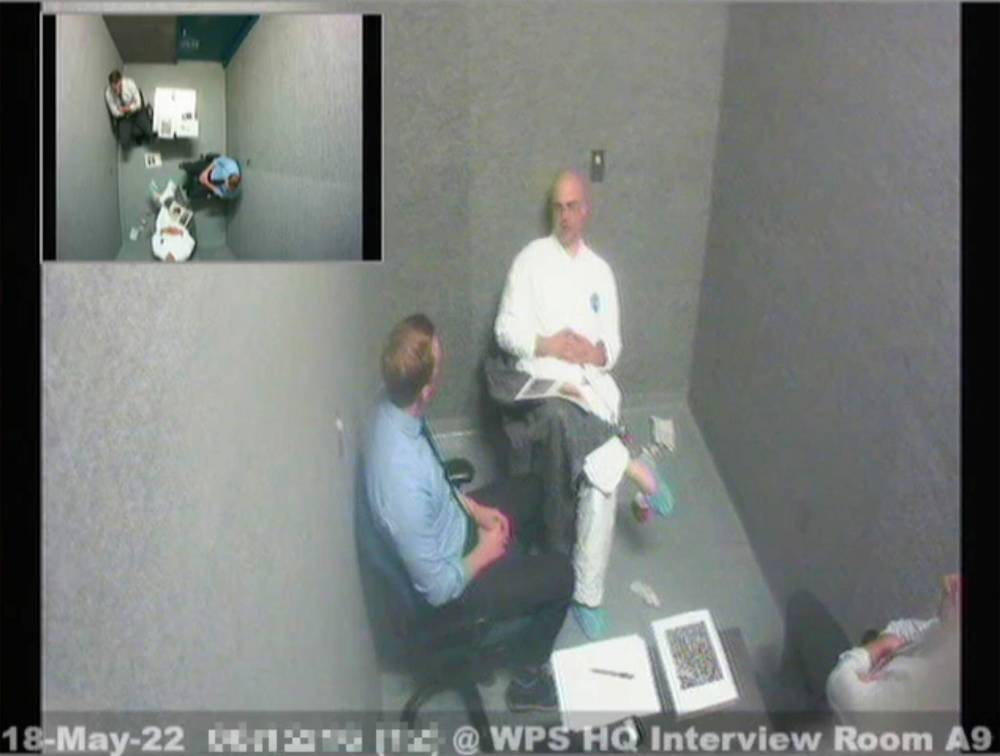Admitted serial killer Jeremy Skibicki says he is a gentle man who doesn’t like hurting people, sleeps well in jail and is generally untroubled by feelings of guilt.
Such claims are included in an 86-page psychiatric report filed in court last week, as the 37-year-old Winnipeg man fights to be found not criminally responsible in the slayings of four vulnerable Indigenous women two years ago.
Skibicki has pleaded not guilty to four counts of first-degree murder in the May 2022 slayings of three Indigenous women — Rebecca Contois, Morgan Harris and Marcedes Myran — as well as a fourth unidentified woman, known as Buffalo Woman, who police believe was slain in March 2022.

Skibicki has pleaded not guilty to four counts of first-degree murder in the May 2022 slayings of Morgan Beatrice Harris (left to right), Marcedes Myran, Rebecca Contois as well as a fourth unidentified woman.
On Wednesday, court heard testimony from the report’s author, forensic psychiatrist Dr. Gary Chaimowitz, who interviewed Skibicki for eight hours over two days last month.
Chaimowitz rejected the defence claim that Skibicki was in the grip of psychotic delusions when he killed the four women, concluding that was a mask for his desire to have sex with dead people, which Chaimowitz classified as “homicidal necrophilia.”
In a police interview video recorded after his May 17, 2022 arrest, Skibicki admitted he had strangled or drowned the victims in his McKay Avenue suite, had sex with their bodies, and then discarded their remains in nearby garbage bins. Skibicki said he had dismembered Contois and Myran.

SUPPLIED
In a police interview video recorded after his May 17, 2022 arrest, Skibicki admitted he had strangled or drowned the victims in his McKay Avenue suite.
As per the report, Skibicki described being sexually aroused by the thought of dead people as early as age 12, when he saw a Second World War-era picture of two Nazi officers with a woman who had been hanged. He began watching necrophilia-themed pornography during his early 20s.
“Mr. Skibicki’s interest is limited to the level of decomposition,” Chaimowitz wrote. “He would occasionally look at images (of) a body and found these arousing. He had some dreams and out-of-body experiences of sex with bodies.”
Skibicki said “he did find watching videos of women actors being killed as enjoyable,” and found so-called breath play — covering the mouth and nose of a woman so she can’t breath — “arousing,” Chaimowitz wrote.
Skibicki told Chaimowitz “he does not like to hurt people and he is gentle most of the time.”
Skibicki claimed while the thought of killing was sexually arousing, he was not aroused when he was killing his victims.
Skibicki said the victims and other women he had sex or relationships with were Indigenous, while at the same time expressing allegiance to a white supremacist ideology. Skibicki said the women shared “specific characteristics… that they were accepting of him, they were often meek and open to be with him” and subservient, Chaimowitz wrote.

Admitted serial killer Jeremy Skibicki says he is a ‘gentle’ man who doesn’t like hurting people.
Skibicki told Chaimowitz he met the victim known only as Buffalo Woman at a drop-in centre and found her “shy and beautiful.” Skibicki said the woman went with him to his suite, where they had sex and “connected emotionally and spiritually.”
Skibicki said the woman was addicted to methamphetamine and alleged she was being trafficked at “demon hotels.” He said when the woman visited his home for the third time, he urged her to stay and “turn her life to God.”
Skibicki told Chaimowitz he “knew he was going to kill her after he had given her every opportunity to remain. He had asked her to stay in the home and turn herself toward God… When he told her she could not leave and she did, he knew that was the time he needed to kill her.”
Skibicki claimed he heard an angel say ‘Just do it’ before choking the woman. He told Chaimowitz he drowned the woman in the bathtub to “limit the amount of suffering.”
After she was dead, Skibicki cleaned her body and had repeated sex with her corpse over a period of eight hours, calling it a “form of sanctification” and act of love, Chaimowitz wrote.
Skibicki wrapped the woman’s body in plastic, and after confirming the garbage pickup schedule, placed it in a plastic garbage bin.
Chaimowitz said he asked Skibicki if he understood what it meant to be found “not criminally responsible” and whether it was something he wanted, to which he responded that he wanted to “anger the public and change the world.”
Chaimowitz said Skibicki told him he “sleeps well” in jail and “does not feel hopeless, helpless, worthless and guilty on a regular basis.”
Chaimowitz rejected much of what Skibicki told him as self-serving “fabrications” geared to supporting his claim he has schizophrenia.
The trial resumes Monday when court will hear closing arguments from the Crown and defence.
dean.pritchard@freepress.mb.ca

Dean Pritchard
Courts reporter
Dean Pritchard is courts reporter for the Free Press. He has covered the justice system since 1999, working for the Brandon Sun and Winnipeg Sun before joining the Free Press in 2019. Read more about Dean.
Every piece of reporting Dean produces is reviewed by an editing team before it is posted online or published in print — part of the Free Press‘s tradition, since 1872, of producing reliable independent journalism. Read more about Free Press’s history and mandate, and learn how our newsroom operates.
Our newsroom depends on a growing audience of readers to power our journalism. If you are not a paid reader, please consider becoming a subscriber.
Our newsroom depends on its audience of readers to power our journalism. Thank you for your support.